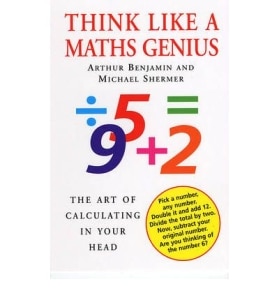Think Like A Maths Genius by Arthur Benjamin and Michael Shermer (book review).
Books like ‘Think Like A Maths Genius’ by Arthur Benjamin and Michael Shermer bring out the inner geek in me. Anything that can improve my abilities is always worth an evaluation. This book also lives up to its name. By the end of the first chapter I was doing additions and subtractions with three and four digit numbers with little effort.
After you’ve read this book, you’ll wonder why their technique of doing sums isn’t taught at school. Essentially, the two authors point out that it is quicker to do sums left to right rather than right to left and treat each part as a mini-sum which is a lot easier to keep in your head. Each of the nine chapters has plenty of examples to test you and bring you up to speed. I’m kinda good at maths anyway and even I found my speed went up. They do press that you should keep this skill up and practice a lot but I suspect once you start doing it their way, you’re going to keep doing it that way, mostly because you get the answers fast and more importantly, accurately.
Rather interestingly, the description of how to convert fractions into decimals was something I was taught at school in a similar manner. Glad some things haven’t changed.
Some things, like factorialising and multiplication of numbers once explained does make a lot of sense and I suspect once you’re assured that it does indeed make the same total will start you doing it their way as well.
The accuracy of even their guestimations within 5% is ingenious in its own way because rounding up or down does balance out the numbers. About the only thing I didn’t get a handle on is number mnemonics but then I have the kind of memory that finds it easier no to use roundabout ways to remember things. As I’m the exception than the rule, I suspect many of you will take to this as well.
To make the deadline for this month, I had to rather reluctantly cut back on the number of examples that I worked through. However, I’ve already found myself employing their methods with number games with a lot more confidence and I can see myself revisiting this book to perfect these skills. Don’t treat this book as a read once and put on the shelf because I suspect you’ll pick up more each time you read.
The last two chapters are a lot more to do with maths tricks and I saw the first one, which is also on the cover, when I was at school. When I learnt how to do it, I would manipulate the answer can confound people even more. I think I would have liked to have seen more algebra applications and some thought given towards statistics.
I know for a lot of you, having a calculator to hand is probably seen as the best solution for any calculations but having the ability to work things out faster than taping in numbers is a useful skill. It would certainly keep your spogs busy over the school holidays. Keep adding up the reasons for buying this book. It’s an easy sum.
GF Willmetts
July 2013
(pub: Souvenir Press. 278 page indexed small enlarged paperback. Pice: £12.99 (UK). ISBN: 978-0-285-63776-4)
check out website: www.souvenirpress.co.uk

